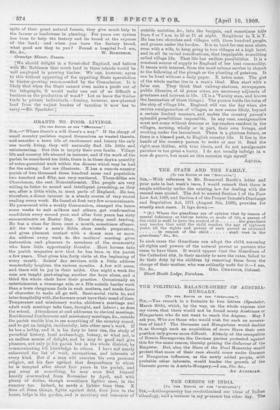GRANTS TO POOR LIVINGS.
[TO Till EDITOR OF TUN " 1011014TOR.] Sin,—" Where there's a will there's a way." If the clergy of small country parishes regard themselves as wasted therein, and consider a town life of excitement and luxury the only one worth living, they will naturally find life little and uninteresting. But this is largely their own faults. Village life and country life abound in interest, and if the work of the parish be considered too little, there is in these days a quantity of extra-parochial work within the diocese which may be had for the asking. Let me illustrate. X has a remote country parish of two thousand three hundred acres and population two hundred and fifty, not very scattered. Three-fifths are Churchmen, the rest Nonconformist. The people are very willing to listen to sound and intelligent preaching, as they arc, after a little while, in most parts of England, He has, therefore, a direct interest in a steady course of very varied reading every week. He found at first very few communicants. He persevered with a weekly Communion, changed the hours some weeks to suit milkers and others, got confirmation candidates every second year, and after four years has sixty communicants on Easter Day. These sheep need tending. He has a class for them once a month, sometimes oftener. All the winter a men's Bible class needs preparation, and gives pleasant contact with a dozen men or more. An address every week to the mothers' meeting gives instruction and pleasure to members of the community who have little opportunity therefor. Most houses take the parish magazine now that he has been in the parish a few years. That gives him forty visits at the beginning of every month. Saints' day services with a little address wonderfully brighten the various months. A few will come, and there will be joy in their midst. One night a week the men are taught part-singing, another the boys alone, and a third the whole choir have their practice. Occasionally an entertainment, a rummage sale, or a fete entails harder work than a town clergyman finds in such matters, and needs force of character to make all go well. Semi-social visits to, and inter-hospitality with, the farmers must have their weed of time. Temperance and missionary works, children's meetings and adult work meetings take time, thought, and labour ; so does the school. Attendance at and addresses to clerical meetings, Ruridecanal Conferences and missionary meetings, &o., outside the parish enable him to see something of the country round, and to get an insight, incidentally, into other men's work. If he has a hobby, and it is his duty to have one, the study of parochial history, local archaeology, botany, or what not, is an endless source of delight, and he may do good and give pleasure, not only u his parish but in the whole district, by communicating hi ls knowledge to others. I have not nearly exhausted the list of work, occupations, and interests of every kind. But if a man will exercise his own personal religion, set his face against that despondency to which he is tempted after about four years in the parish, and peg away at something, Ile may soon find himself heavily overworked from November to April, and with plenty of duties, though sometimes lighter ones, in the summer too. Indeed, he needs a lighter time then. X does all these things, fights against debt, does jobs in the house, helps in the garden, and is secretary and treasurer of outside societies, &c., into the bargain, and sometimes toile from 6 or 7 a.m. to 10 or 11 at night. Neighbour to X is Y. He has two churches and villages with three hundred people, and groans under the burden. It is so hard for one man alone, even with a wife, to keep going in two villages at a high level, and in all its varied ramifications, that impalpable something called village life. That life has endless possibilities. It is a constant source of supply to England of her best commodity. It teems with interest, from tire most solemn service in church to the following of the plough or the planting of potatoes. It can be lived without a daily paper. X takes none. The gist of the whole matter lies in a man's ideal. Men start with a false one. They think that railway-stations, newspapers, public libraries, et id genus °Mite, are necessary adjuncts of greatness and interest in life. (X is a 'Varsity man, and knows the fascination of these things.) The parson holds the helm of the ship of village life. England will rue the day when she carries amalgamation of villages, as now seems likely, beyond a certain limited measure, and makes the country parson's splendid possibilities impossible. In any case, amalgamation must not come without deacons or lay-readers resident in the villages, earning, wholly or in part, their own livings, and working under the incumbent. There is a glorious future, as there is a blessed past, to English country life. It lies in the hands of the country parson to make or mar it. Send the right men thither, with true ideals, and do not amalgamate parishes in too great a burry. I do not usually indulge in, a nom, de guerre, but must on thie occasion sign myself
AQUILA.






































 Previous page
Previous page